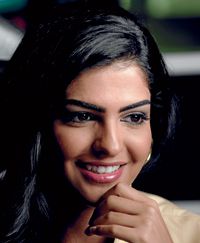1 Sheikha Lubna Al Qasimi
Is it tough at the top? Ask Sheikha Lubna Al Qasimi. For the second year running, the UAE’s first female minister tops our women’s power list. And it’s not just any ministerial position; Sheikha Lubna’s brief involves promoting greater trade ties with international partners, which is a vital part of the UAE’s diversification strategy.
2 Tawakkul Karman
Tawakkul Karman is undoubtedly the female face of the Arab Spring. The youngest winner of the Nobel Peace Prize - aged just 32 - Karman has found herself touring the world, bringing Yemen’s plight before diplomats and fighting for women’s rights.3 Lubna Olayan
As the CEO of the Riyadh-based Olayan Financing Company, Lubna Olayan is one of Saudi Arabia’s most prolific businesswomen.
The group, which was founded by her father in 1947, is one of the kingdom’s most successful conglomerates with operations spanning distribution, manufacturing, services and investments, across the Middle East. The firm is also one of the largest investors in the Saudi and regional stock markets.
4 Princess Ameerah Al Taweel
The wife of HRH Prince Alwaleed Bin Talal, Princess Ameerah is now one of the world’s most recognised philanthropists through her work at her husband’s foundation. She supports a wide range of humanitarian interests both in Saudi Arabia and across the world.
5 Raja Easa Al Gurg
Raja Easa Al Gurg wears many hats. Not only is she the managing director of the Easa Saleh Al Gurg Group, the firm of which her father is chairman, but she is also president of the Dubai Business Women’s Council.
Al Gurg is also deputy chairperson of the board of directors at Dubai Healthcare City Authority, and a board member at both the Dubai Chamber of Commerce & Industry and the Dubai Women’s Council. She is also a member of the Dubai Economic Council, the Arab International Women’s Forum, the National Advisory Council and the College of Business Sciences.
6 Dr. Amina Al Rustamani
Many in Dubai will be familiar with the name Dr Amina Al Rustamani, the CEO of TECOM Business Parks, the umbrella organisation for nine of Dubai’s free zones.
Al Rustamani joined TECOM in 2001 as a project engineer for Samacom and quickly moved up the ranks, taking control of Dubai Media City, Dubai Studio City and International Media Production Zone as the executive director of media for TECOM Investments. Al Rustamani has also played a significant role in establishing Dubai International Film Festival and is a regular contributor to leading technical journals in the fields of wireless technology around the world.
7 Sheikha Munira Qubeysi
Sheikha Munira Qubeysi is the founder of Qubeysiat, an Islamic group created for women, focusing on organising religious lessons for them.
It has been regarded as instrumental in the spread of religious sentiment amongst young women in the region. The movement was banned in Syria until 2006, when the Syrian government eventually gave its approval and allowed it to teach religion in the country’s mosques. The foundation directs over 80 schools in Damascus alone, teaching 75,000 students. Born in 1933, Sheikha Munira has seen her organisation spread throughout the Middle East, as a result of which, she now has a huge network of madrassas, all built without attracting the ire of local government. By training a new generation of female Islamic scholars, Sheikha Qubeysi has made Islamic knowledge widely accessible.
8 Sheikha Al Bahar
Sheikha Al Bahar started at the National Bank of Kuwait, one of the region’s largest financial institutions, as a trainee.
Today, as the CEO, she manages a portfolio of $16bn and is responsible for loans business, marketing, investment banking and treasury. She also specialises in large and structured finance transactions and contributes to strategy and planning. Sheikha Al Bahar has a degree in international marketing from the Kuwait University, and has attended schools including Harvard Business School, California University, Stanford University and Duke University. She was formerly chairwoman of the Al Watany Bank of Egypt and is vice chair at NBK Capital, the bank’s investment arm. She also sits on the board of the International Bank of Qatar.
9 Hayat Sindi
Hayat Sindi’s astonishing medical career started with a lie; worried that her family would not let her study abroad, she told her father that she had already been accepted into a prestigious university in the UK.
When she landed in London as a teenager in 1991, she had no university place, no money, and didn’t speak English. Hard work and determination got her a place at King’s College, Cambridge. In 2001, she won a PhD in biotechnology from the top university and has been credited with the invention of MARS (Magnetic Acoustic Resonance Sensor), which combines the effects of light and sound for use in biotechnology. After a stint as a visiting scholar at Harvard, she co-founded Diagnostics for All, an organisation developing a disease-diagnosing paper that changes colours when dabbed with the bodily fluids of someone who is ill. Sindi is also a fellow at PopTech, a US-based non-profit organisation that offers fellowships to scientists promoting innovation. Last year, she launched the Institute for Imagination and Ingenuity, a Middle East focused foundation that will help scientists create business plans and find investors for their ideas.
10 Kholoud Faqih
holoud Faqih made history in 2009 as one of the first women to be appointed as an Islamic judge in Palestine.
The Islamic courts were perhaps the last men-only bastion in the country and the move may well be replicated by other Middle Eastern nations. Faqih won two degrees from the University of Jerusalem, and received her licence in 2001. Between 2003 and 2008, she gained extensive litigation experience, primarily from working for an agency that defends battered women. Faqih beat out dozens of men in the Islamic law exams to secure the post. “I compare us to other Arab Muslim women, and I think we’ve done well,” Faqih told MSNBC in 2009.








